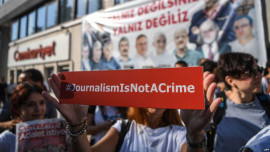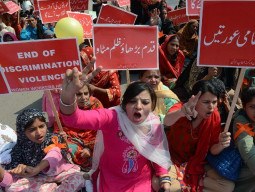
KARACHI: Pakistan witnessed fewer militant attacks in 2017 as compared to previous years despite political turmoil, the Human Rights Watch (HRW) observed in its annual World Report on Thursday.
The report, however, highlighted that “scores of people were killed in attacks primarily targeting law enforcement officials and minorities.”
The New-York based group, which reviews human rights practices in more than 90 countries in its yearly report, observed that "security forces remained unaccountable for human rights violations and exercised disproportionate political influence over civilian authorities, especially in matters of national security and counter-terrorism”.
World Report 2018: Fighting for Rights Succeeds https://t.co/IxtP1komMv #Rights2018 pic.twitter.com/ECUQxNtMAL
— Human Rights Watch (@hrw) January 18, 2018
With 44 executions in the last year, at least 19 others remain on death row after being convicted under the blasphemy law while hundreds await trial, the report said, as it noted an increase in blasphemy-related violence in the country. It blamed the government of encouraging “discriminatory prosecutions and other forms of discrimination against vulnerable groups” and using “religious rhetoric inciting hatred against minority groups”.
On paper only, human rights situation better
The HRW observed that “enforced disappearances” targeting suspected militants “became a nationwide policy with the targeting of bloggers and activists all over Pakistan” in 2017 as counter-terrorism laws “continued to be misused as an instrument of political coercion and to silence dissenting voices.”
Meanwhile, the journalist community practiced self-censorship with media outlets “under pressure to avoid reporting on or criticising human rights violations during counter-terrorism operations”, the report read.
Freedom of expression, according to the HRW, remained under threat as “Taliban and other armed groups threatened media outlets and attacked journalists and activists because of their work”.
Dissenting voices in non-governmental organisations were also "muzzled". The human rights watchdog claimed to have received “credible reports of intimidation, harassment, and surveillance of various NGOs by government authorities”.
“The government used the “Regulation of INGOs in Pakistan” policy to impede the registration and functioning of international humanitarian and human rights groups,” it said.
Violence against women and girls remained a concern with over 180 cases of domestic violence reported in Khyber Pakhtunkhwa alone – including 94 women murdered by close family members, the report found. “The Khyber Pakhtunkhwa draft domestic violence bill received wide public criticism for exempting parents and spouses when they use “corrective measures” against female family members, raising the concern that it will legitimize some forms of domestic violence.”
According to the United Nations Children’s Fund (UNICEF) 21 per cent of girls in Pakistan were married before the age of 18. With over five million primary-school-aged children remaining out of school and most of them females, HRW research discovered that “girls miss school for reasons including lack of schools, costs associated with studying, child bearing, and gender discrimination.”
Meanwhile “attacks on schools and the use of children in suicide bombings by the Taliban and affiliated armed extremist groups continued during the year.”
On the positive side, however, the HRW noted the number of repatriations of Afghan refugees decreased significantly compared to 2016.
The government’s move to recognise gender identity through a bill safeguarding the rights of transgender persons was highlighted in the report. “The inclusion of the transgender population in the 2017 census and the first-ever proposed transgender law were positive developments,” it said. “In June, the Pakistan government issued the first passport with a transgender category.”
The European Union Foreign Affairs Council also welcomed several positive measures taken by Islamabad including the agreement to set up an electronic platform for processing readmission applications. It noted the establishment of the cooperation platform on migrant smuggling and encouraged the government to fully utilise it as one of the avenues in the fight against migrant smuggling.
The Hindu Marriage Act recognising and regulating marriages of the members of the minority community depicted the country in a positive light at global stage.
Read the full report here




































1713525343-0/WhatsApp-Image-2024-04-19-at-4-09-16-PM-(1)1713525343-0-270x192.webp)
1713525453-0/Henry-Cavill-in-James-Bond-(AI)1713525453-0-270x192.webp)
























COMMENTS
Comments are moderated and generally will be posted if they are on-topic and not abusive.
For more information, please see our Comments FAQ